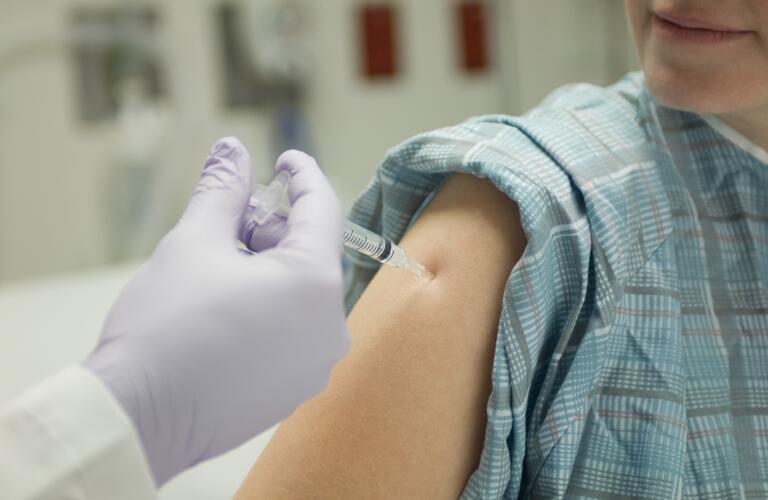
Few topics provoke as much passionate debate as vaccination. Online communities, real-life playgrounds and pediatricians’ offices are full of vaccine advocates, staunch “anti-vaxxers,” and plenty of parents who aren’t sure what to think or whom to believe. Ever wonder what your doctor really thinks about the debate? Here’s some straight talk from pediatricians and infectious disease specialists.
Vaccines undergo extensive safety testing, including at least three rounds of clinical trials, before the Food and Drug Administration (FDA) will even consider approving the vaccine for widespread use. If the FDA has any concerns about the vaccine’s safety, it can request additional studies. All vaccines and vaccine safety studies are reviewed by a multi-disciplinary team of experts—including microbiologists, chemists, biostatisticians and medical officers—and manufacturing facilities are also inspected carefully. In contrast, most vitamins and supplements are not reviewed, regulated or approved by the FDA or other third-party agency. “It’s amazing to me that parents will walk into a health food store and buy vitamins and supplements off the shelf for their kids, but question vaccines,” says Paul Offit, MD.
Doctors are as concerned about vaccine safety as anyone. “One of the common misconceptions parents have is the idea that once a vaccine is licensed, nobody really looks at the safety issues,” says Daniel Salmon, PhD. “That’s just not correct.” Phase 4 studies examine the safety and effectiveness of vaccines once they hit the market, and both the Centers for Disease Control (CDC) and FDA monitor reports to the Vaccine Adverse Event Reporting System. The CDC’s Vaccine Safety Data Link and the FDA’s Post-Licensure Rapid Immunization Safety Monitoring Program allow clinicians and researchers to look for links between vaccines and adverse health events. Clinical Immunization Safety Assessment Centers, based at major academic institutions, also study suspected links between vaccines and negative effects.
No vaccine is 100% effective, but the vaccines in wide use today are extremely effective. According to the U.S. Department of Health & Human Services, childhood vaccines induce immunity 90 to 100% of the time. And your child’s odds of staying healthy with vaccination are definitely better than without vaccination. “Vaccines are the best thing in medicine, because they can prevent infection before it happens,” says Mobeen Rathore, MD.
The vaccines selected for inclusion in the childhood immunization schedule, as well as the number of doses of vaccines and the timing of vaccination, have been planned for maximum benefit. “Some vaccines are just not as effective at younger ages,” Dr. Rathore says. “We spend hours discussing vaccines and where they should be on the schedule, based on what the scientific research says about what’s most beneficial to the patient.”
Some parents choose to delay or space out vaccinations, but that’s a risky choice. “In the time that you’re waiting, your child is vulnerable to disease,” Dr. Salmon says. “And often, depending on the disease, if your child gets it when he’s young, it’s more serious than it would be if he got it when he’s older.”
Additionally, unvaccinated children can spread disease to others, including children who are too young to be vaccinated and children and adults who are immunosuppressed. “Imagine you have a child with leukemia,” Dr. Salmon says. “Your child is fragile and ill, and the only hope you have that your child is not going to get one of these diseases is if everybody else vaccinates, because you can’t vaccinate your child.”
It’s easy to think of polio, mumps and rubella as diseases of the past. After all, few parents today know anyone who’s ever had any of those diseases. Yet these diseases have disappeared from public prominence due to vaccination—and if vaccine rates continue to decline, it’s likely we’ll see a resurgence of some of these “old-time” diseases. “If you don’t give the vaccines to your child and other children don’t get vaccinated, these diseases can come back, as we’ve seen with measles,” Dr. Rathore says. “We have to be very careful to keep our vaccine rates high if we want to keep these diseases at bay.”
It’s not uncommon for kids to get three immunizations or more at once. The current childhood immunization schedule recommends rotavirus, DTaP (diphtheria, tetanus and pertussis), Haemophilus influenzae, pneumococcal and polio immunizations at two months, and some parents worry that so many vaccines at such a young age might be more than a young child’s body can handle. But that’s simply not true. “The amount of antigens children are exposed to via vaccination is not just a drop in the ocean metaphorically, but literally,” says Dr. Offit, noting that human immune systems seamlessly handle exposure to thousands of new and different antigens on a daily basis.
Parents sometimes resist vaccinations for diseases they don’t consider particularly severe (such as chickenpox) or relevant to their child (such as the Hepatitis A vaccine, given that Hep A is more prevalent overseas). “I have seen children become very sick and require hospitalization for diseases,” Dr. Rathore says. “The question you have to ask yourself is, ‘Which malady do you want your children to have?’ Do you want them to have Hepatitis A? You have to decide as a parent which disease you’re willing your child to have.”
Yes, kids today get more vaccines than their parents did as children, but that’s a fact to be celebrated, doctors say. “The fact that there are more vaccines to protect against more diseases is fundamentally a really good thing,” Dr. Salmon says. “That’s why we’ve invested billions of dollars in developing these vaccines and in purchasing and using them—because they’ve been shown to save a lot of lives.”







